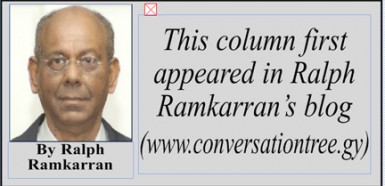It appears as if the Georgetown City Council has already decided in principle to install parking meters in Georgetown for the purpose of creating an additional source of revenue. The streets in which the meters are to be installed are Avenue of the Republic, Regent Street, Robb Street, Camp Street, Main Street, Brickdam, Water Street, America Street and Church Street. This decision should be reconsidered.

Owners of motor vehicles who park them on the roads in Georgetown, either for long or short periods, while at work or for any other purpose except residential, have not been consulted. Since a financial burden is to be imposed on these persons, one would have thought that both democratic principles and respect for the public that is to be burdened by the imposition would dictate that prior to the implementation of the decision to install parking meters, there would have been adequate consultation.
The election of the city council to office does not give it a right to unilaterally exercise authority where the expectation exists that consultation will take place or where the public has a right to be heard if its interests are to be affected. This is particularly so in relation to the installation of parking meters. There is no case more deserving of consultation than this unjustifiable burden that is now proposed to be placed on citizens. There is such a dearth of information and so many imponderables that it is incumbent on the city council to speak with and consult the citizenry.
In relation to the parking meters, even basic information is lacking, except that the meters will have instructions in Spanish and Portuguese and 911, which has many challenges, can be called! For example, are employees who park outside of their offices for eight or nine hours a day expected to pay what may be unaffordable sums per month for parking? And if they have to get their children to school every day from out of Georgetown, what are they to do in the absence of an efficient, cheap and safe transport system?
And why are specific streets selected? For example, why Church Street and not North Road? What answer would the city council give to the person who is employed in Church Street who asks why he or she has to pay for eight hours of parking while the North Road employee has to pay nothing?
There appears to be a mass of confusion in the city council about the awarding of the contract. In the first place there has never been any tender. However, one contract with one company was entered into since 1996. A second contract with another company was made in 2007.
During the earlier part of last week it appears that the decision out of this conundrum was to split these ancient contracts, giving some areas to one company and some to the other. In the latter part of the week it was being alleged that one of the companies does not have the competence.
We also learn that the contractor will take 80 per cent of the revenue from the parking meters while the city council will get 20 per cent from off the top. This smells very much like a get-rich-quick scheme to exploit owners of motor vehicles, many of whom are regular working people, for the substantial benefit of the 80 per cent private contractor(s) and not the city council.
It appears that, generally, transport engineers understand the system of parking meters to be part of a larger project that involves many elements of city planning. It is much more than a fund-raising effort. It is also designed to limit motor vehicle traffic, to reduce traffic congestion, to regulate traffic flow, to improve safety for pedestrians, to reduce pollution and many other factors.
Owners of motor vehicles who have to use them to travel to and park in Georgetown are sitting ducks because there is no alternative public transport system that is efficient, cheap and safe that can be used. If the city council wants to tax the use of motor vehicles, it must first provide such a system of transportation. It is doubtful that any sane person will argue that minibuses provide a safe alternative.
The city council has alternatives. Firstly, it can impose a tax on taxis and minibuses which use city roads as a major and free resource for their business through which they profit considerably. Secondly, the taxes on domestic properties can be increased by the properties being revalued and the percentage of taxes chargeable adjusted downwards so that the increase would be affordable.
Taxes for domestic properties have not been increased for decades and are ridiculously low. Even though many low income property owners would find it difficult to pay even modest increases, the fact remains that the city council has a good argument for such a plan. No one can reasonably complain if these alternative courses are taken.





